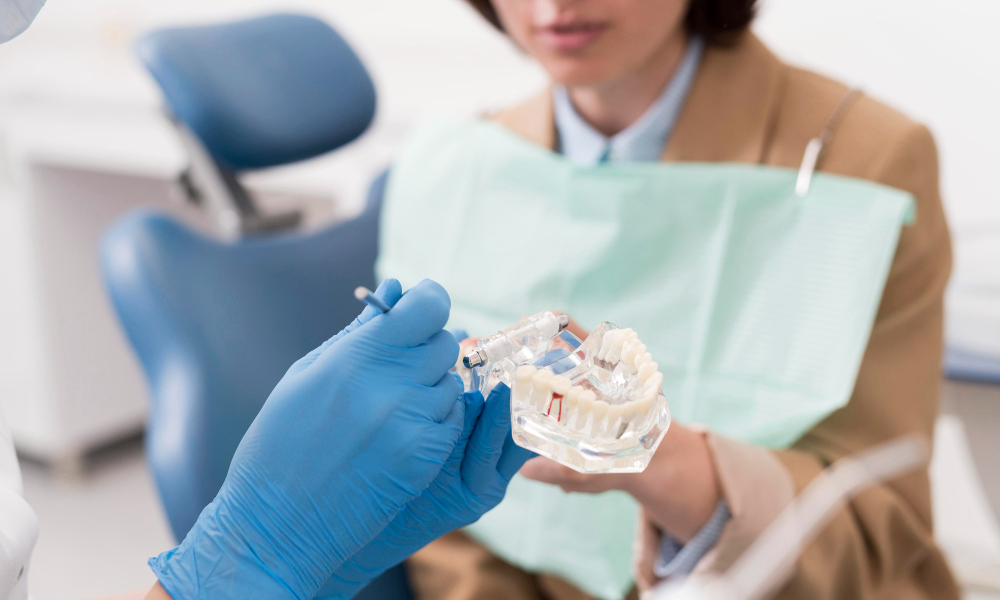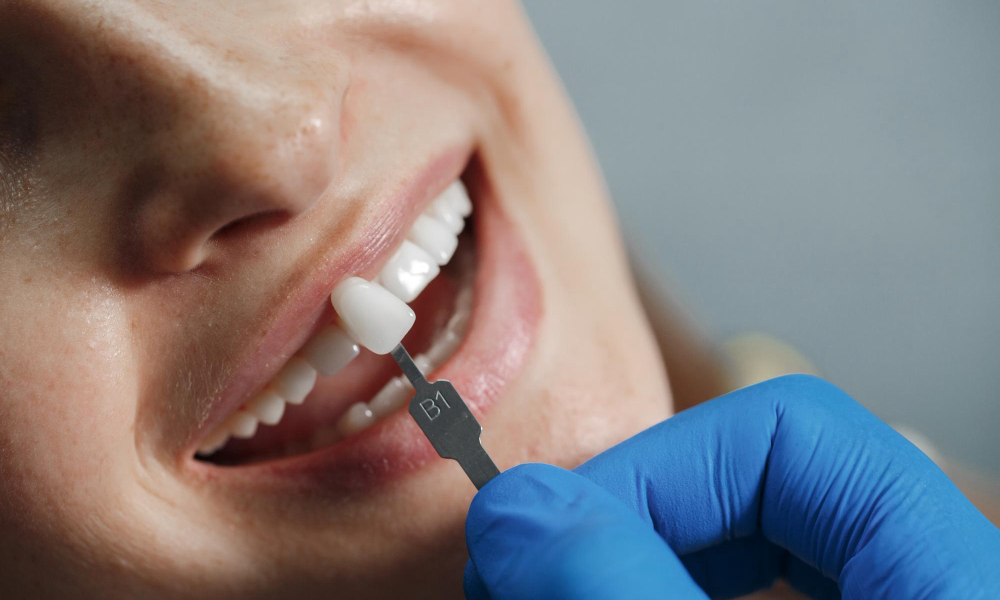Missing teeth can affect a person in many ways. It can dent their confidence with the way they present themselves during social gatherings or in the workplace. It can also make biting and chewing difficult, eventually affecting their health in the long run. Other dental diseases can also stem from missing teeth such as shifting of other teeth and bite problems.
With these consequences, it is important that missing teeth are replaced as soon as possible. In this page, we will explore the options available for replacing missing teeth such as dental implants, dental bridges, and dentures. By the end of it, we should be able to shed more light on the pros and cons of each, and help you understand the best option for your smile.
Dental Implants
Dental implants are the most modern option to replace missing teeth. They are incredibly versatile, making them an ideal choice whether you are missing just one tooth, a few teeth, or even a full set of teeth in the arch. For full-arch cases, options such as the All-on-4 approach may be recommended.
A single dental implant system is composed of three parts:
- A titanium post acts as the tooth root. This is embedded into the bone through dental implant surgery. Eventually, bone will fuse with the implant to create a solid foundation for the future artificial tooth.
- The artificial tooth is a dental crown which should mimic the appearance of the teeth adjacent to it.
- An abutment will hold both pieces together to create a functional and natural-looking tooth replacement.
Benefits of Dental Implants
There are several reasons why dental implants are superior over other alternatives, such as:
- Long-term smile solution – Dental implant units are made to last a lifetime, with the artificial tooth needing replacement only after 10 years or so due to significant wear and tear.
- Bone preservation – Implant posts are able to support bone level by preventing bone loss.
- Conservative treatment – This treatment does not rely on adjacent teeth, making it a highly conservative procedure.

Procedure and Recovery Time
The dental implant process is usually divided into three stages. The first stage is surgery where the implant post is placed in the bone. If preparatory procedures are required, such as bone grafts or sinus lift, this is done prior. Then, recovery period will take up to 6 months. During this time, the bone will fuse with the implant in a process called Osseointegration. To learn more about typical outcomes, see our overview of the success rate of dental implants. This will signal the success of the implant surgery. The last step is the placement of the artificial tooth to complete your new smile.
Considerations and Costs
Not everyone is an ideal candidate – Proper screening should be done to ensure you are qualified for the treatment. Ideally, you should be of good oral and overall health to clear you for surgery.
Implants can be quite expensive – The procedure starts at $3,000. This can still vary on the complexity of the case.
Implant failure is rare but can occur – Infection is one of the reasons why your implant may fail. Other risks also include nerve damage and sinus problems.
Dental Bridges
Another option you can consider for missing teeth is a dental bridge. It is recommended if you have 1 to 3 adjacent missing teeth. A dental bridge consists of two partsー abutments, these are supporting teeth which are usually on both sides of the tooth gap and will anchor the future bridge; then the pontic, which is the artificial tooth that will replace the gap.
Types of Dental Bridges
- Traditional Bridge – This is the most common type of bridge. It uses two teeth as abutments to hold the artificial crown in the middle.
- Maryland Bridge – As a more conservative option, you can consider a Maryland Bridge which uses a metal clasp bonded to the back of the adjacent tooth to hold a crown in place.
- Implant-Supported Bridge – Implants can also be used to hold a dental bridge. This will usually require at least two implant posts on each end of the gap for efficient support for the bridge.Benefits of Dental Bridges
If you are looking to get this option, here are some of the benefits you can enjoy:
- Fixed in the mouth – Dental bridges should stay in place even as you chew and speak, making them a comfortable choice
- Cost-effective – They are typically more affordable than implants
- Faster process – The treatment involves a quick turnaround time for quicker results
- Aesthetic and functional restoration – The material for a dental bridge can be made using the strongest (zirconia) or most natural-looking (porcelain) material
Benefits of Dental Bridges
If you are looking to get a bridge to restore your smile, here are the benefits you can enjoy:
- Cost-effective – This option is typically more affordable than implants.
- Faster process – The turnaround time for dental bridges is expected to be within 3 dental visits.
- Aesthetic and functional option – Dental bridges can be made using porcelain to achieve a highly natural finish or zirconia for maximum strength during functions such as chewing and biting.
Procedure and Recovery Time
A traditional dental bridge uses two abutments, which are teeth located on both sides of the tooth gap, to position the bridge. These abutments are reduced to a smaller size to accommodate the bridge. Once cemented in place, you can immediately start using it for daily functions. Recovery time is very minimal, with only minor sensitivity expected during the first few days of treatment.
Considerations and Costs
- Abutments require healthy teeth – The main disadvantage of a dental bridge is that it requires the altering of healthy teeth to use as abutments so they can hold the artificial tooth steady.
- Average cost – A dental bridge starts at $2,000, with variations depending on the material to be used. Metal-porcelain material is usually cheaper compared to full ceramic options.

Dentures
Dentures are removable prosthetics that can be used to replace multiple missing teeth. Partial dentures are recommended where there are some tooth gaps, while full dentures are for the replacement of a full set of upper or lower teeth, or both.
Benefits of Dentures
This conventional option offers several advantages over modern alternatives, such as:
- Easy maintenance – Dentures can be easily removed and cleaned after every use, making it easy to keep them in good shape for a long time.
- Affordable – These are considered as the most pocket-friendly teeth replacement
- Non-invasive – Dentures rely on gums, not natural teeth, to keep them in place
Procedure and Recovery Time
When you come in to get dentures, you will first be fitted with a teeth mould or a scan of your mouth will be obtained. This is sent to the laboratory where your dentures will be made. A trial fit is then done to check if any adjustments are needed. These are completed accordingly to ensure a comfortable fit to your final prosthetics. The recovery time is also minimal, but patients will need some time to get accustomed to their new dentures.
Considerations and Costs
- A learning curve is expected – New dentures will usually make patients feel uncomfortable. But, it is advised that the dentures are used properly to help them adjust faster.
- Budget- and patient-friendly – This option is suitable for a wide range of patients, especially those with budget limits.
- Not as efficient in the long-term – Dentures may naturally loosen over time because they are not able to preserve bone. Eventually, they will need replacement to prevent any difficulties during use.
Contact Arbutus Station Dental Today
The replacement of missing teeth is essential for your appearance, confidence, oral health, and overall quality of life. But with several options available, how do you choose which is best for you?
Some factors to consider are your aesthetic preferences, treatment goals, lifestyle and budget considerations, and your oral health status. It is best to discuss these with a dental professional so they can recommend the most suitable teeth replacement for you.
If you have missing teeth and do not know how to choose, our team at Arbutus Station Dental can help you explore your options. Contact us today to schedule your consultation!
